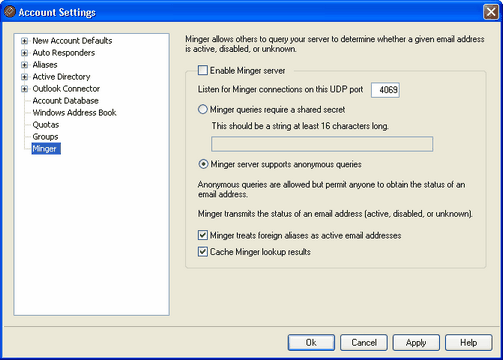
Located under Accounts » Account Settings, Minger is an email address verification protocol created by Alt-N Technologies. Originally based loosely on the Finger protocol, Minger is primarily intended to provide a simple and efficient mechanism for allowing others to query your server in order to verify whether or not an email address is valid. For efficiency Minger uses UDP rather than TCP, and for security it can require authenticationthough it supports anonymous queries as well. The Minger dialog is used to enable/disable MDaemon's Minger server, designate the port that it will use (the default is 4069), and choose whether to require authentication via a shared secret system or to allow anonymous queries.
MDaemon also has a Minger client, which is built in to the Domain Gateways system (see Verification). Each domain for which MDaemon is acting as a gateway or backup server can be configured to use Minger so that MDaemon will connect to the remote server and verify whether or not the recipients of incoming messages for that domain are valid. This prevents you from having to assume that all recipients are valid addresses.
You can find the latest draft of the Minger protocol at:
http://tools.ietf.org/html/draft-hathcock-minger-05
Minger Server
Enable Minger server
Click this checkbox to enable MDaemon's Minger server.
Listen for Minger connections on this UDP port
This is the port on which the Minger server will listen for connections. The Internet Assigned Numbers Authority (IANA) has reserved and assigned TCP and UDP port 4069 for use with Minger clients and servers. Changing this port is not recommended as it has been reserved exclusively for Minger use.
Minger queries require a shared secret
If you wish to require authentication via a shared secret system, choose this option and enter a text string of at least 16 characters. When this option is chosen the Minger server will refuse unauthenticated queries.
Minger server supports anonymous queries
Choose this option if you wish to support anonymous Minger queriesthe connecting client isn't required to authenticate itself before making address verification queries. This is similar to what can be accomplished now by sources using the SMTP VRFY command or SMTP "call back" or "call forward", but it is much more efficient and doesn't result in lots of dropped SMTP sessions over TCP, SMTP logs cluttered with dropped sessions, and similar problems inherent in those methods.
Minger treats foreign aliases as active email addresses
When this box is checked, Minger will treat foreign aliases (aliases that point to external addresses) as if they were active known addresses. Also, this behavior is forced when a query comes from SecurityGateway to MDaemon regardless of the state of this option's setting.
Cache Minger lookup results
By default MDaemon will cache Minger lookup results. If you do not wish to cache them, disable this option.